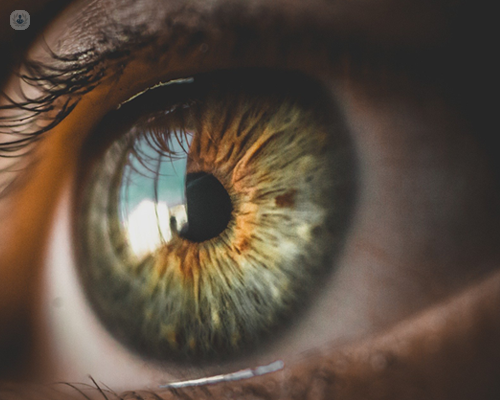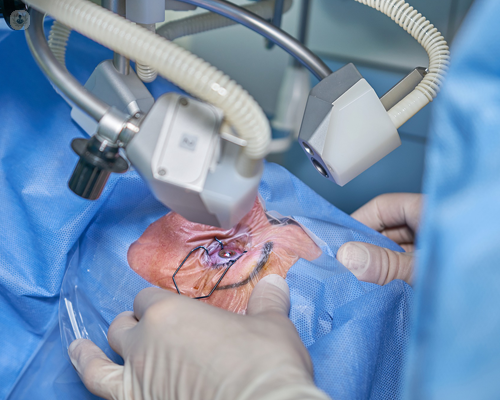Monofocal, Trifocal and EDOF intraocular lenses: Which ones are right for me?
Escrito por:At The Harley Street Eye Centre, part of the Blue Fin Vision Clinic group of eye health clinics, we believe in providing patients with knowledge empowering them to make informed decisions about their eye health. Understanding the different types of intraocular lenses (IOLs) is essential when it comes to cataract surgery or lens replacement.
This informative and detailed guide to the pros and cons of monofocal, trifocal, and Extended Depth of Focus (EDOF) intraocular lenses provides a comprehensive idea of what results to expect from each type – and most important, which ones are right for you.

What are Intraocular Lenses?
Intraocular lenses (IOLs) are replacements for the eye’s natural lens. They’re artificial, and are implanted during cataract surgery, or refractive lens exchange. They’re designed to correct vision and reduce dependence on glasses or contact lenses. Let’s delve into the three main types of IOLs:
Monofocal Intraocular Lenses
For many years, Monofocal lenses have been the standard in cataract surgery.
Pros of Monofocal lenses:
- Excellent distance vision: They give sharp, clear vision at one focal point, and are typically set for distance vision.
- Reliable results: Monofocal lenses offer consistent results, and meet expected outcomes.
- Cost-effective: Usually, these lenses are covered by insurance and are the most affordable option.
- Glare and halo reduction: Patients have fewer visual disturbances with Monofocal lenses in comparison to other types of lenses.
- Suitable for many patients: Monofocals are a good option for a wide range of individuals, including those that have certain eye conditions.
Cons of Monofocal lenses:
- Limited vision range: It’s likely patients require glasses for close-up and mid-range tasks.
- Monofocal lenses have less versatility: Without glasses, they don’t provide a full range of vision.

All about Trifocal Intraocular Lenses
Trifocal IOLs are designed to provide clear vision at multiple distances. They reduce the need for glasses post-surgery.
What are the pros of Trifocal lenses?
- Overall vision: Trifocal IOLs provide clear vision at near, intermediate, and far distances.
- They improve quality of life: When it comes to daily activities, many Trifocal IOL patients enjoy greater freedom from glasses.
- Trifocal IOLs can be customisable: Designs can be tailored to the visual and lifestyle needs of patients.
- Results are long-lasting: Trifocal IOLs provide a permanent solution to vision correction.
What are the cons of Trifocal lenses?
- Visual disturbance: Patients may experience glare, halos or contrast sensitivity reduction, especially in conditions that are in low-light. However, it’s highly probable they will adapt over time.
- Period of adaptation: It may take some time for the brain to adjust.
- Cost: Typically, Trifocal IOLs are more expensive than Monofocal lenses. Furthermore, the may not available on insurance cover.
- Trifocal lenses aren’t suitable for everyone: Patients that have specific eye conditions may not be ideal candidates.
What are Extended Depth of Focus (EDOF) Intraocular Lenses?
EDOF lenses are a newer innovation in intraocular lenses. They’re designed to provide an extended range of vision, as well as minimising some of the drawbacks associated with trifocal lenses.
EDOF lenses pros:
- Extended range of vision: EDOF lenses offer clear vision from distance to mid-range, with functional near vision.
- Reduction in visual disturbances: Typically, patients with EDOF lenses have less issues with glare and halos in comparison to trifocal lenses.
- Easier adaptation: The body’s visual system tends to adapt quicker to EDOF lenses.
- Improved night vision: EDOF lenses generally perform well in low-light conditions.
Cons of EDOF lenses:
- Visual disturbances: Patients of EDOF lenses experience glare, halos, or reduced contrast sensitivity, especially in low light conditions. However, their eyes will adapt over time.
- Limitations with near-vision: Near vision, while functional, may not be as sharp as with trifocal lenses.
- Cost: More expensive than monofocal options.
- Limited long-term evidence: As EDOF lenses are a newer technology, there’s less long-term information available about their effectiveness and how long-lasting they are, for example, in comparison to monofocal and trifocal lenses.
How does vision quality compare between each type of IOL?
The following points help us understand the visual performance of different IOLs better:
- Monofocal lenses: Result in good distance vision only.
- Trifocal lenses: Provide the most comprehensive vision. This means they effectively cover distance, mid- and near range.
- Extended Depth of Focus (EDOF) Intraocular lenses: EDOF lenses result in good distance and intermediate vision, but have relatively poor near vision.
It’s important to note that all premium lenses (trifocal and EDOF) cause night-vision issues such as glare, halos and starbursts. Some manufacturers claim reduced halos with EDOF lenses, however the reduction in near vision is more quantifiable. The Blue Fin Vision team prefers to consult patients on these potential effects, while offering excellent vision options covering all types of trifocal lenses.

What’s the right IOL for me?
Choosing the ideal intraocular lens is a personal decision. It should be made with full consultation from your eye surgeon. Here at our London eye clinic, we consider several factors when recommending intraocular lenses:
- Eye health overall: Certain eye conditions may put a limitation on your options.
- Expectations: We’re realistic about outcomes, and the potential need for glasses in various situations.
- Lifestyle: Consideration of your daily activities, hobbies and visual needs.
- Occupation: Your work requirements may influence your choice for the best lenses.
- Budget: Consideration of the implications of the cost of premium lenses.
Our approach at Blue Fin Vision
At The Harley Street Eye Centre, part of Blue Fin Vision’s eye clinics in London, we pride ourselves in offering the latest in IOL technology and personalised care. Our highly-experienced surgeons:
- Undertake comprehensive eye examinations
- Discuss your lifestyle needs and visual goals
- Explain all IOL options that are available, in detail
- Address questions or concerns patients have
- Recommend, and tailor, the best IOL solution to your unique situation
We exclusively use trifocal lenses for patients who choose premium IOL options. This ensures that all of our patients benefit from improved intermediate vision as well as near and distance correction.

Embracing clarity of vision
Selecting an IOL is a significant decision, and it can have a significant impact on your quality of life. Whether you opt for Monofocal lenses and their reliability, the comprehensive overall vision of Trifocal IOLs, or the EDOF lenses’ balanced performance, the Blue Fin Vision team is committed in assisting you to enjoy the best possible visual outcomes.
Remember, the ideal IOL for you is dependent on your eye health, preferences and individual needs. We highly encourage you to arrange a consultation at our London eye clinic, where you can investigate your options and take the first step towards more comfortable, clear vision.
You can look forward to a future of improved vision and a reduced dependence on glasses - with the right choice of lenses. Blue Fin Vision Clinic can guide you through this life-changing journey, combining compassionate care and cutting-edge technology on Harley Street.
Your vision is precious, and your eye health is our top priority. It’s clear you’re in the right hands with the Blue Fin Vision experts.


